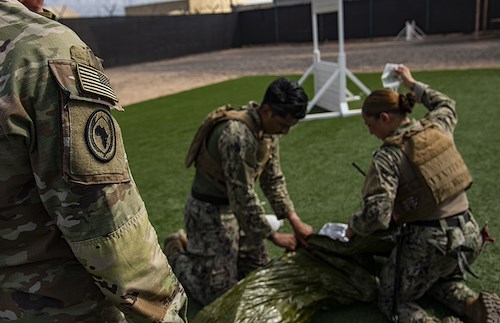

The Expeditionary Medical Facility (EMF) veterinary services led a Canine Tactical Combat Casualty Care (TCCC) training with Navy security Military Working Dog (MWD) handlers at Camp Lemonnier, Djibouti, Jan. 6, 2023.
The EMF veterinary services used their training canine to simulate MWD battlefield trauma so the handlers could practice realistic point-of-injury care.
During the training, the MWD handlers focused on assessing and treating for massive hemorrhage, airway, respiration, circulation, and head injury and hypothermia, also known as the MARCH method. MARCH is used by TCCC-trained individuals to address the most life-threatening injuries first. The only difference for canine casualty care is an extra “M” in the beginning to represent muzzling the MWD first in order to avoid unintentional biting during treatment.
“I am the only veterinarian in theater, so I’m not always going to be there when a dog gets injured,” said U.S. Army Capt. Lizzy Everham, expeditionary medical facility veterinary services director. “The handlers will be the first line of care, so it's really important for the handlers to know their point-of-injury care procedures and protocols in order to save the dog's life.”
Not only do the MWD handlers need to be properly trained to provide tactical care to their canines, but so do all individuals who interact and work with the dogs and their partners.
“If something were to happen and I, as the handler, were to go down, somebody else would need to be able to take my position as the handler to control my dog and perform care on him,” said U.S. Navy Petty Officer 2nd Class Valerie Goodblanket, a Navy Master-at-Arms security MWD handler. “It is vital to have others to rely on, because if I am not in the picture, then who else is going to be? So it's important for everyone who comes in contact with us or who we work alongside to know what it is they need to do in order to control a dog, care for the dog, and how care differs from human to canine if the handler is unavailable.”
In addition to training with Camp Lemonnier and Combined Joint Task Force - Horn of Africa (CJTF-HOA) MWD handlers, the EMF veterinarians also conduct medical knowledge exchanges with international partners. Everham recently led a canine TCCC class during a Military Tropical Medicine Course, which hosted multinational partners and other U.S. military medical professionals.
“One team, one fight,” said Everham. “We're here to support each other. I feel like it's important especially for not only all branches to be on the same page and be trained up the same, especially for medical care, so that we can all provide the same level of care to our service members, both canine and human. But for our international partners it's important as well because we help each other so they could help us in a bad situation, just as we would help them. So I think it's important that we all have the same level of training and knowledge so that we can provide support to each other.”
The 2022 National Defense Strategy (NDS) states that the U.S. must prioritize interoperability, and having the front line of defense medically trained to the point of feeling and being proficient in the act of saving their partners’ lives.
“It's very important for me to be able to take care of my dog, because he is my partner,” said Goodblanket. “He's no different from anybody else as far as humans go. He is an asset to the team.”